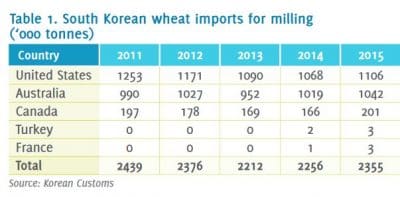THE Australian Grains Export Innovation Centre (AEGIC) has provided new updates on the competitive position of Black Sea grain in global export markets, and on the importance of South Korea to Australia’s wheat and barley export market.
Black Sea grain
In a seminar held earlier this month, Prof Ross Kingwell, Dr Chris Carter and Dr Peter White, from AEGIC’s economics team, outlined the nature of the competitive threat from the Black Sea countries, and described some of the reforms the Australian grains industry should consider in order to bolster its competitive position.
The one hour seminar can be viewed in full on the video link above this article.
South Korea: A focus for Australian wheat and barley exports
South Korea was Australia’s largest customer for malt, and third-largest market for malting barley, according to an Australian Grains Export Innovation Centre (AEGIC) fact sheet published last week.
Entitled “A focus for Australian wheat and barley exports”, the report also looked at South Korea as the market for a sizeable chunk of Australia’s two major cereal exports.
Wheat
Imports from all countries wheat for milling were 2.4 million tonnes in 2015, including one million tonnes from Australia.
Wheat milled into flour is approximately two-thirds into noodle manufacture and one-third baking.

source : AEGIC, most of Australia’s wheat exports to South Korea are a noodle blend
South Korea is the second largest export market for Australian wheat in volume and value. Around 80pc of Australia’s shipments of wheat milled for flour are a blend from WA of Australian Noodle (ANW) and Australian Premium White (APW) in the ratio 30 pc and 70 pc respectively.
South Korea’s other main supplier of milling wheat is the US, while a small tonnage is sourced from Canada.
In 2015, South Korean local wheat production was 35,000 tonnes.
Feedgrain
South Korea imports about 10 million tonnes of feed grains, mostly corn. Australia’s feed ingredient sales to South Korea are relatively small and variable compared with corn imports.
About South Korea
South Korea is Asia’s third largest economy behind China and Japan, and ranks twelfth in the world. The economy is growing fast, and represents Australia’s third-largest export market.
South Korea is a long-term customer for Australian beef, offal and sugar as well as wheat, barley and malt.
Source: AEGIC. To read the two-page summary of the South Korea report click here.

HAVE YOUR SAY